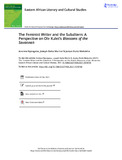The Feminist Writer and the Subaltern: A Perspective on Ole Kulet’s Blossoms of the Savannah

View/
Date
2021-12Author
Nyongesa, Andrew W.
Murimi, J. G.
Makokha, J. K.
Metadata
Show full item recordAbstract
Dominant literary conversations like post-structuralism have crowned the literary writer as an impartial and reliable voice for the voiceless in oppressive cultural settings. Since the marginal group is weak and cannot speak for themselves, the intellectual is given express authority to articulate their issues. Emerging voices have nonetheless questioned the author’s eligibility to speak for the marginal groups. Given the diversity typical of the marginal group, these voices doubt the author’s ability to perfectly represent it. This perspective piece extends the conversation that the literary writer lacks the capacity to speak for the marginal group because of their heterogeneity. Using the post-colonial concept of representation, this review interrogates the literary writer’s articulation of issues affecting marginal groups in Ole Kulet’s Blossoms of the Savannah. The ideas of Gayatri Spivak and Chandra Mohanty will form the theoretical basis of interpretation. This review proceeds through close textual reading of the primary text, secondary texts and refereed journal articles. The major finding of the study is that Kulet takes the trajectory of Western feminists to not only generalise attributes and experiences in male and female characters, but silences divergent voices in the marginal group he purportedly attempts to represent and is therefore biased.
URI
https://www.tandfonline.com/doi/full/10.1080/23277408.2021.1978766http://hdl.handle.net/123456789/6158
https://doi.org/10.1080/23277408.2021.1978766
